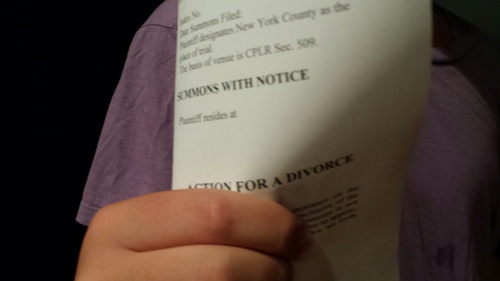It is 6 a.m., and there is a knock on the door. It is a process server sent by your soon-to-be ex to personally serve you with the summons for divorce. What do you do?
While couples marry, hoping to spend their entire lives together, life does not always go as planned. Disputes or misunderstandings arise, couples grow apart. For some, divorce is inevitable.
As a marriage ceremony celebrates the start of a marriage, the service of a summons for divorce signals the end of the marriage and the commencement of proceedings to legally dissolve the marital relationship.
As divorce is a legal proceeding, every divorce, whether contested or uncontested, begins with the service of a summons. Depending on the nature of the case in New York, you may be served with a summons with notice, a summons, and complaint, or a summons with a motion seeking some immediate court relief.
The papers could come as a complete surprise or after a long negotiation during which all the details of the divorce have been resolved, and service is acknowledged as a mere formality.
So, what do you do when you are served with divorce papers? Besides, the obvious answer, tell your New York divorce lawyer, the answer is it depends!
Uncontested v. Contested Divorces
Divorces in New York are classified into two broad categories: contested and uncontested. An uncontested divorce is exactly what the name term suggests-a divorce that will not be litigated or fought. In many uncontested cases, the parties have negotiated and settled all the property, economic, and custody issues before filing any court papers. The divorce settlement terms must be reduced to writing, sometimes called a settlement agreement or stipulation of settlement. In this type of uncontested case, the service of a summons is a mere formality necessary to obtain the legal divorce.
In a contested divorce, some, if not all, issues require the divorce court to determine some issues. Generally, in a contested case, a process server serves the summons on the defendant.
When served with a summons, the person served can:
- Appear in the action and if the summons is served with a complaint, answer the complaint;
- Male a motion, inter alia, challenging the jurisdiction of the court or the validity of service;
- Do nothing and default.
Divorce by Default
If the party served with the summons does nothing for twenty days after service is complete, the defendant will be in default. After a default, the New York divorce court will treat the case as an uncontested divorce. Absent the defendant appearing in the case, the divorce will be granted once the necessary papers are filed.
A divorce based upon the defendant’s default is commonly referred to as a ‘’no signature divorce.
Speak to an Experienced New York Divorce Attorney
If you are served with a summons in divorce, don’t ignore it. You have to take action to defend and protect your rights. As soon as you are served, contact us or call us at 212-683-9551


